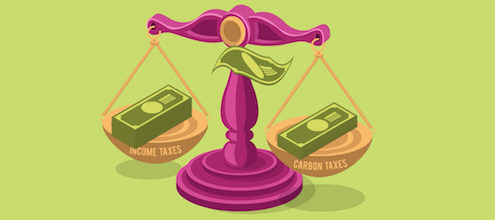
Choosing Wisely: Nova Scotia
Has a swell of support for carbon pricing been building in Nova Scotia? In 2014, the Roundtable on Environment and Sustainable Prosperity recommended the consideration of implementing a provincial or regional revenue-neutral carbon tax. Similar recommendations were echoed by the NS Tax and Regulatory Review. The idea of an Atlantic carbon pricing system across multiple provinces has also been floated by provincial leaders.
Carbon pricing, whether of provincial or regional design, would generate substantial revenue for the province. But how could these revenues be best spent? The Ecofiscal Commission’s newest report, Choose Wisely, explores this question by weighing the difficult trade-offs of different revenue recycling options in the context of unique provincial circumstances and priorities.
What revenue recycling options may work best for Nova Scotia?
The report considers how Nova Scotia’s context might make each option for revenue recycling a higher or a lower priority. We don’t propose concrete recommendations—provincial governments are best positioned to identify their own priorities. But we do take a look at how different trade-offs might make each option a higher or lower priority for Nova Scotia.
Transfers to households
Nova Scotia’s economy is still reliant on coal-fired electricity for the bulk of its energy. As such, the costs of a carbon price for households in Nova Scotia will be higher than in other provinces, which will have a disproportionate impact on low-income households. Direct transfers would help offset regressive impacts from higher energy prices; our analysis shows that offsetting the full burden for low-income households in the province would require transferring 3% to 13% of carbon revenues.
Income tax cuts
Nova Scotia has some of the highest corporate and personal income taxes in the country. As a result, cutting these taxes could be a higher priority than other revenue-recycling alternatives and can improve investment, productivity, and long-run growth.
Clean-technology investments
Unlike most other provinces, Nova Scotia is currently projected to meet its GHG emissions reduction target for 2020. An economy-wide price on carbon would nonetheless create powerful incentives for transitioning to an even less emissions-intensive economy, and could help build a local cleantech industry. This could tap into the province’s renewable energy resources, such as tidal and wind power.
Infrastructure investments
Nova Scotia has one of the oldest stocks of public infrastructure in Canada, which includes its roads, bridges, sewers, waterways, and wastewater facilities. Increased investments in the past decade have helped counter the signs of ageing, but the province still has major infrastructure needs. Carbon revenues could help to finance some of these needed upgrades.
Reduction of public debt
Nova Scotia’s public debt-to-GDP ratio is the third-highest among all the provinces and has been approximately stable over the past decade. While reducing public debt might provide some long-term economic benefits for Nova Scotia, including greater fairness to future generations, shorter-term economic concerns are probably a bigger priority.
Transitional support to industry
Because the economy is small, competitiveness pressures bring high stakes. Using revenues for targeted and transitional support for vulnerable industries could thus be quite practical for Nova Scotia. Over time this support could be gradually removed as carbon pricing policies are implemented in other jurisdictions.

What should Nova Scotians choose?
Recycling carbon revenues offers new opportunities to enhance incentives for people to live, work, and invest in Nova Scotia, while improving its environmental performance. In particular, the unique demographic context in the province—marked by an aging and shrinking population—will likely play an important role in the provincial (and regional) dialogue. If the wave of carbon pricing continues to build across the east coast of Canada, Nova Scotians will need to choose wisely about where they might park their carbon pricing dollars.
Event: The Revenue Recycling Opportunity for Atlantic Canada
Our expert panel discuss the the trade-offs of different revenue recycling options, including how to address household fairness and business competitiveness in Atlantic Canada.
Watch the panel discussion




Comments are closed.